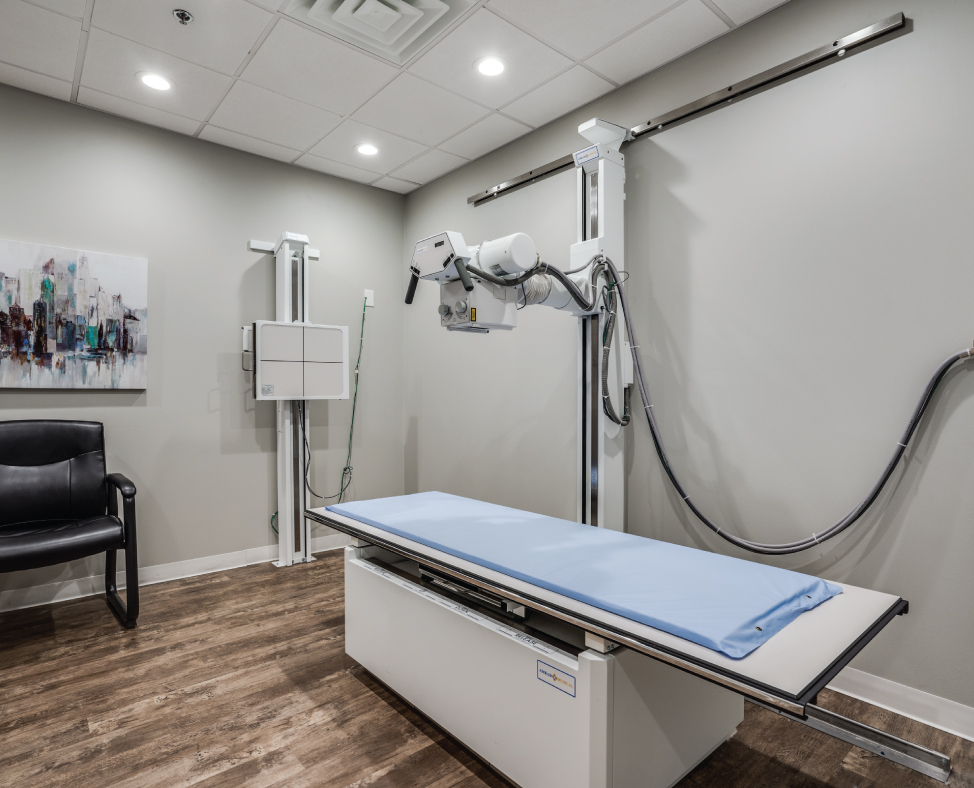How does a chest ultrasound detect heart problems?
Your healthcare provider might recommend a chest ultrasound, alongside other diagnostic imaging tests, when they want a closer look at the blood flow…

At Gateway Diagnostic Imaging, you can receive top-tier x-ray imaging services in the Dallas-Fort Worth area at an affordable price, same-day. Learn more about receiving a diagnostic x-ray and what you can expect from Gateway Diagnostic Imaging.

An x-ray creates an image of the inside of your body using radiation. During the exam, x-ray beams are shot through your body. Denser body parts, like bones, absorb more radiation and appear white on the x-ray image, while less dense body parts, like muscle, absorb less radiation and appear gray. This makes x-rays especially useful for finding bone fractures or infections. X-rays can also be used to identify other health conditions, such as a lung infection, enlarged heart, or digestive tract problems.

Before an x-ray, you’ll need to remove any clothing that covers the area being examined. You might be asked to wear a gown or to remove glasses, jewelry, or any other metal because it can block x-ray imaging.
During your x-ray, the technologist may ask you to sit, stand, or lie down, depending on what area of the body you’re having examined. Your technologist may move your body into different positions and ask you to hold still while the x-ray image is being taken.
Most x-rays are quick, taking just a few minutes. More complicated imaging may take longer.

Your x-ray can be fast and affordable with Gateway Diagnostic Imaging. Our 12 locations offer extended hours and we accept walk-in x-ray patients, ensuring you can get the imaging you need when it’s most convenient for you.
To make sure our x-rays are wallet-friendly, we work with all major insurance companies, accept CareCredit®, and offer financial assistance programs.
An x-ray is a form of electromagnetic radiation that passes through the body and can produce images of bones and some organs. X-ray images can reveal signs of bone damage, disease, and other health conditions.
Most insurance companies require x-ray referrals from a licensed healthcare provider.
The radiation exposure from a typical x-ray is low and not likely to cause harm. There are many precautions in place to protect you as well as the technologist who performs x-rays daily. Read more about how safe x-rays are.
Rest assured the minimal x-ray radiation levels utilized are unlikely to pose any harm., Your doctor would not recommend you for an x–ray unless it was urgent. There are additional safety precautions that can be taken for pregnant patients.
If the patient is a child, a parental figure or guardian may be allowed in the room. However, for the overall safety and efficiency of the scan, we ask family members to stay in the waiting room during the imaging process, unless needed.
The length of the scan can vary depending on the type of x-ray and the number of images your provider has requested. Overall, most x–ray scans are quick, and only take a few minutes to complete. During your appointment, you can ask your tech for an estimate of how long your specific scan is expected to take.
In general, the x-rays themselves are painless, but your experience may vary depending on individual factors. The technologist may ask you to lay down, sit, or stand in a specific position. You must stay still for this brief period, which could cause discomfort if you have mobility issues or are already in pain. If you are concerned, let your x-ray technician know and they may be able to provide you with padding to support your body.
Some x-rays may have different preparations; your Gateway Diagnostic imaging center will inform you of any specifics you may have to follow. In general, we suggest dressing comfortably and be prepared to remove any glasses, jewelry, hearing aids, or metal objects near the part of your body being imaged. You may also be asked to change into a gown depending on the part of your body being imaged.
In most cases yes, you may eat and drink normally. If you are scheduled for an X-ray for your gastrointestinal tract or using contrast dye, then your doctor may give you specific instructions about fasting before your appointment.
Your healthcare provider might recommend a chest ultrasound, alongside other diagnostic imaging tests, when they want a closer look at the blood flow…
When your healthcare provider wants to know whether you have a brain tumor, they may recommend a CT scan, which can give them…
Shoulder pain can be very difficult to live with, and for some people, it can even limit or change what they’re able to…

